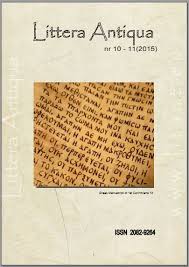Color affectus jako źródło semantycznej ewolucji terminu pietas
Color affectus as a source of semantic evolution of Latin term pietas
Author(s): Łukasz HalidaSubject(s): Literary Texts, Cultural history, Ancient World
Published by: Katolicki Uniwersytet Lubelski Jana Pawła II - Instytut Filologii Klasycznej
Summary/Abstract: According to Cicero, the term pietas stands for officium and iustitia. The meaning of this term in classical Roman literature signifies sense of duty, especially towards the gods, parents and country which has it’s source in mos maiorum culture. Yet when we read texts of the ancient Christian literature as well as Latin prayers present in the liturgy of Roman Catholic Church, we find other, very surprising and interesting meaning of pietas. Christian authors use this term as a synonym of love, affection, goodness and benignity.Where is the source of this semantic evolution? When we analyze more precisely the works of classical writer, we can find some texts in which pitas is used in more affectional and emotional tone. For instance pietas erga parentes in Aetna poem is not only motivated by sense of duty, but also by love and affection towards the parents. Moreover, Plautus in one of his comedies use phrae mea pietas in the meaning of “my darling”. What is more, some classical authors, like Suetonius, use term pietas as a synonym of clemency and mercy. This affectional tone (color affectus) is a source of semantic evolution of Latin term pietas.
Journal: Littera Antiqua
- Issue Year: 2015
- Issue No: 10
- Page Range: 229-241
- Page Count: 13
- Language: Polish

